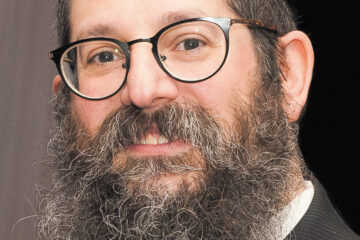Captain Rattan and President Sarkozy
Religion May 2010
By Rabbi Nochum Mangel, Chabad of Greater Dayton
Special To The Dayton Jewish Observer, May 2010
| Rabbi Nochum Mangel |
Near the end of March, Captain Tejdeep Singh Rattan, a 31-year-old dentist, graduated as an officer at Fort Sam Houston after the U.S. Army made an exemption to a uniform policy that had effectively prevented Sikhs from enlisting since 1984.
Prior to that year, Sikhs, Jews and others who wished to wear beards or religious head coverings were routinely granted exceptions to the normal military dress policy. In 1984, a policy reversal effectively eliminated the participation of Sikhs in American armed forces, in which they had served with distinction since World War I.
Rattan was proud and happy to be able to serve the country to which he had immigrated and which had offered him so many opportunities. He felt it important, though, to point out a flaw in the then-current policy. “If government can say to someone, ‘You can’t serve, not for any reason that has to do with your abilities, that sends the wrong message,” he said. “We don’t want to be perpetual outsiders.”
Most important for him and his co-religionists, Sikh spokesperson Harsimran Kaur said, was the idea that this will be the beginning of a renewed accommodation of religious faith. “We’re still working toward a day when Sikhs don’t have to check their faith at the door,” she said.
About the same time that Capt. Rattan was celebrating his graduation, French President Sarkozy moved to turn his personal dislike for certain Muslim women’s headwear into law.
He proposed a statute to prohibit (in some public places) the burqa and other garments which fully cover a woman’s face.
“The full veil is contrary to the dignity of women,” the president said. “The response is to ban it. The Government will draft a law prohibiting it.”
The two differing attitudes embodied in the exception granted Capt. Rattan and in Sarkozy’s campaign are things we have experienced as Jews.
More than 2,000 years ago, Antiochus IV, the villain of the Chanukah story, imposed a law on his Jewish subjects forbidding circumcision and kosher slaughtering, among other observances. Two centuries later, Hadrian, the Roman emperor, did the same, likewise motivated by a strong cultural antipathy toward Jewish practices.
Such attitudes have continued into modern times. Kosher slaughter was banned in 19th-century Germany and Switzerland, and, when Nazism grew in power and influence, in many countries throughout Europe. Soviet Russia enforced similar restrictions.
These memories of our own experience should caution us. Do we really want government to enforce its view of what dignity is on all its citizens?
If the face must be uncovered for reasons of public safety, we should have no problem in supporting such a law. It was important when KKK members were forced to take off their masks in public and shed their anonymity. No longer could they terrorize with the same impunity.
If a woman were being forced to wear a face covering against her will, it would be the job of the state to protect her freedom. We cannot support anyone being coerced into religious practice. And we forcefully stand against those who would deny a woman the right to the same freedom of expression as men enjoy.
But should a government tell a woman that her choice in dress, informed by her religious beliefs, cannot be considered dignified? Should a government use force to supplant her conception of what constitutes her dignity with its own?
Jewish law, indeed, teaches modesty. Though it does not require total concealment, it feels that for both men and women, provocative and revealing dress is not reflective of the image of God.
We Jews should not welcome a government stepping in and telling adults of what their dignity consists. As long as no one is being endangered, governments should not restrict religious practice at all.
Certainly, such things as turbans, beards and face coverings are unusual. But why should we be afraid of difference? Diversity is a sign of life and strength. America shows its vibrant health when the town square has a place for the holiday messages of all our faith communities. The more we accept the variety of voices, the more surely can we distinguish that which is dangerous and harmful from that which is just different.
As Jews, we should say that we can all learn from our neighbors. We appreciate both the respect for freedom and the importance of modesty. In a world informed by Jewish values, all would strive to learn what to cherish as essential and necessary and what to discard as imbalanced and disruptive.
There are still those who are not content unless they can regulate other peoples’ worship. Laws to forbid circumcision were recently considered by a committee in the Massachusetts legislature, and by the Danish parliament. France forbids boys wearing yarmulkes in public schools.
Switzerland not only would not consider lifting its century-old ban on kosher slaughtering, but also even entertained a proposal to ban the importation of kosher meat from beyond its borders. And as one Norwegian politician said about his own country’s ban on kosher slaughter, “If Jews don’t like it, they should go elsewhere.”
We do not wish to empower such ideas and voices.
Let President Sarkozy enforce laws against honor killings and the violence against Jews that has grown rampant among France’s immigrant population. If anyone tries to defend those things on religious grounds, ignore them. But we Jews should stand up for the rights of all to worship God without state interference, as long as no one is being harmed.
A few months before Capt. Rattan’s graduation, a young Chabad rabbi who had been tentatively accepted into the U.S. Army’s chaplaincy program received an e-mail notice revoking the acceptance because he would not shave his beard due to religious reasons.
Let us recognize the greater wisdom of the policy implicit in accepting Capt. Rattan. America is a better country and we Jews are better off when no one ever feels required to “leave their religion at the door.”





